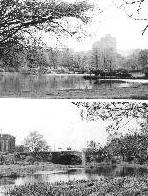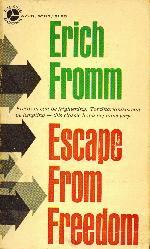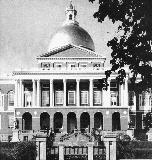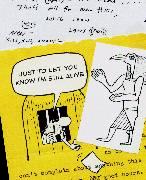 BOSTON STATE
BOSTON STATE
More properly, State College at Boston: SCAB. Student ID, 389971 -- briefly Rigyard Beeoxt
|
 CIVIL SPACE
CIVIL SPACE
The only one: The Fens; the Museum of Fine Art lost in mist, top. Photos: Boston Architecture
|
An American Education
College
Higher education (yeah, sure)
Boston State College, as I've said not a patch on Ayer High, had I think been built as a high school: a few red brick buildings on a single block of Huntington Avenue (at Longwood, Harvard's medical school up the way); a newer one, maybe six storeys, plunked among them.
Just east was the Isabella Stewart Gardner Museum (never went in), the Fens' watered green necklace (there often), and the Boston Museum of Fine Art (often as I could). On the block behind was a high school: Boston English -- well more than a patch up, academically and culturally, on its neighbouring red brick.
Boston State sat amidst riches it seemed loath to know (but for the Fens, the only campus we had). It was parochial in the worst sense: not Catholic, though most kids there were, but intensely local. Italians from the North End, Irish from South Boston; from Charlestown both; kids from Brighton, Hyde Park, Jamaica Plain.
I was, I think, from farther away than any of them: all of 35 miles. A few were Jewish, fewer Asian, very few black. Odd, that might seem: Huntington marked the northern edge of Roxbury -- with parts of Dorchester beyond, "the ghetto."
We did not cross Huntington Avenue. That street was as much a wall as real ones had been in the original ghettos of Europe.
In Toronto, at first, I'd be surprised not to find them -- if finding neighbourhoods of Chinese, Italians, Greeks, Poles, Portuguese, East Indians; shop signs there in their language, local papers too. But nowhere were they the only sort of people around, likely not even the majority. Just enough to set the tone of a place, places you could find yourself in with no sense of having crossed a line.
In Boston the lines were firm, attempts to break them firmly resisted. The city was in the grips of "bussing" madness, the school board's Louise Day Hicks rousing the rabble of Southie, who didn't want their kids put on busses to Roxbury or, worse, kids of the wrong colour stepping off busses and into "their" schools.
The political cover was noble enough: strong neighbourhoods; local control. The gut impulse was racist. Of course: as class is the bedrock of British politics; in Canada, language (if religion first, connected with language), race is the fundamental subtext of all American politics.
On a visit to Boston years later, I think in 1987, I'd wander down Huntington to see my old alma mater. It was no more. The buildings were there, but the signs read "Roxbury Community College." Very interesting, I thought. Much more interesting than anything I'd seen on that turf years before.
I did make a few friends there. We hung out sometimes in the cafeteria, in a basement of one of the old buildings; more often around a table in what was called, if not at all lounge like, the Student Lounge on the second floor of that newer one.
There was Ginny, from Brighton; I forget her last name, if not that her father was a cop. Larry Rubin, who wanted to be a cop, even hung out with a few: he'd joke about raids on Boston's most notorious "fruit bar," the aptly named Punch Bowl.
A Jewish cop? Well, there must be a few and Larry was big enough, if his face maybe too nice: a bit soft, even goopy; a sweet demeanor.
He liked me, I him -- imagining all of him big, and succulent. After I left he wrote to say he missed me, hoped I might come back. He signed off: "Larry (fuzz) XXXX -- kiss, kiss, smack!" Well, college boys can be like that, as I'd later find in spades, no matter how they turn out.
Maxine Band, also Jewish, to whom everything was "cute" -- particularly boyfriend Eddie; they'd neck over on the Fens. She'd later write and tell me she and Eddie had gone to an auto show, and a demolition derby, "surprised to see how undangerous it looks."
Vibrant Lois Leonardo of Brookline: she (and others) often called me "Rigyard" -- the name first bestowed on my by BSC's computer: Rigyard Beeoxt.
Moe Laffin, my first real hippie, at least in style. Danny DeStefano, a funny boy from Medford, into Egyptology and our lounge table's crack chess player -- even drunk, as I once found him, at 1:14 pm.
Danny would write later: "Everybody says 'Hi!' (A few probably even say 'High!', but enough of that.) Moe's wife (?) gave birth to a baby girl. The child has since been named Pamela, for reason's known only to the parents." He illustrated that letter (saying he always did), with "Dehuty (Greek, Thoth) the Patron Saint of Writing."
I'd never been "high." That part of the Sixties I missed. Even still, but for booze, more congenial. Grass, I'd find in my few tries, killed the one thing I most crave: real talk. It's hell on short term memory.
Mostly, there was Dorothy Andrews. Dotty, like best friend Ginny, was a motherly type, watching over the lot of us.
Myself in particular. Dotty was in love with me, obviously -- a fact met on my part obliviously. Not entirely without awareness, even conscience: I knew we were close. We spent lots of time together; I'd even met her mother.
Dotty was the only friend to see me off from Logan Airport (my first time on a plane), flying out of all their lives. But for hers, later and briefly: she visited for Christmas 1969; I'd see her once on a trip back to Boston. After that we lost touch. She became a nurse: my brother Gary told me, he once her patient. I could feel bad about Dotty; hurtful in my distance. But she knew, surely by Christmas, likely before. People often do.
Women especially: the buzz is different. All those A Team girls at Ayer High: they must have sensed it. They may not have named that sense (and I never did), aware -- especially then -- that the label could forcefully mean "Other." An other that, often enough, they wanted: another person; part of everyday life. A friend, as I wanted them to be.
Once with Dotty, talk of Pierre Trudeau's decriminalization of homosexuality in Canada came up. She looked at me and said: "Is that why you want to go?" Trudeau would have been enough. During that 1968 election campaign one could see bumper stickers around Boston: "Pierre Trudeau for President." Walking along Boylston Street I'd always choose the north side, so I could look up to a high floor on the south, at number 500: the Canadian Consulate.
Occasionally I'd flash a peace sign.
 UNHOLY BIBLE
UNHOLY BIBLE
Erich Fromm's 1941 study (reissued 1965) on what can drive folks -- not just Volk -- to totalitarianism
LUTHER & HITLER
"Fromm's interpretation is especially relevant: the desire for psychological security is not limited to Germany. The tendency to give up one's individuality to the crowd, to public opinion, exists in America to a great degree." We needed, I said, "serious and far reaching examination" of our own lives, as "defense against tyranny, be it that of the crowd, the fad, or the dictator."
Examine I would, inevitably in these times. They were not happy ones.
|
Still, some were good. Well, two I recall, they in fact quite good.
Anne Williamson, young and very smart, taught English. I was in her Sophomore class. She once recited Chaucer, in wondrous rhythms. I'd not even begun to get The Canterbury Tales before that. She'd write a letter of reference for me to Canada Immigration (as would Donn Brown of St Andrew's). In her covering note she said:
- "I must say I was struck with being able to write truthfully that I had a student both level headed and imaginative ... I'll never forget your remarking, when I asked the class Socratically if the Pardoner was depraved, that you thought he was just a good pragmatic 14th century Christian ... teachers do remember these things."
Good ones. I had one other: Professor Jenko, Gv202, Political Theory. I don't recall his first name. I do recall his classes, particularly for his exchanges with a smug if smart right wing kid (not a rare breed then among Boston's working classes).
Dr Jenko's comments were, of course, "balanced." But I came away understanding the fundamentally different senses of human life and justice held by left (loosely speaking) and right. And which sense he was inclined to share.
I wrote two papers for him, my only substantial ones at State. One on Martin Luther -- as warmongering proto fascist and anti Semite: "Luther and Hitler: A Comparative Study of Reformation Thought and the Totalitarian State of Mind" (with, I should have admitted, apologies to Erich Fromm's Escape from Freedom).
The other was on Thomas Aquinas, I'd hoped as a basis for going on about modern American religion. Too broad, Dr Jenko said; I settled, I think, for Just War. But I can't be sure: I'd later lend it to a kid at the University of Toronto's St Michael's College, curious to see how some Basilian Father might mark it. I never found out.
Dr Jenko called my Reformation rant "an excellent and stimulating paper." He gave it an A minus. Nearly my lowest mark: for one term of World Civilization I got a B plus. The prof later said she was sorry.
A science teacher and I had a game: he'd ask a question and look at me, a silent stare waiting out a bet that no one but I would answer. He (and I? certainly not They) nearly always won. Sometimes we'd smile -- in embarrassment, utter and awful and mostly my own.
That year at Boston State, second of the usual four, would, blessedly, be my last.
Next: Real politics: In Cold War America
Go back to An American Education / Introduction
This page: http://www.rbebout.com/me/bsc.htm
February 2001 / Last revised: October 5, 2001
Rick Bébout © 2001 / rick@rbebout.com

 STATELY BOSTON
STATELY BOSTON
 CUTE CORRESPONDENCE
CUTE CORRESPONDENCE